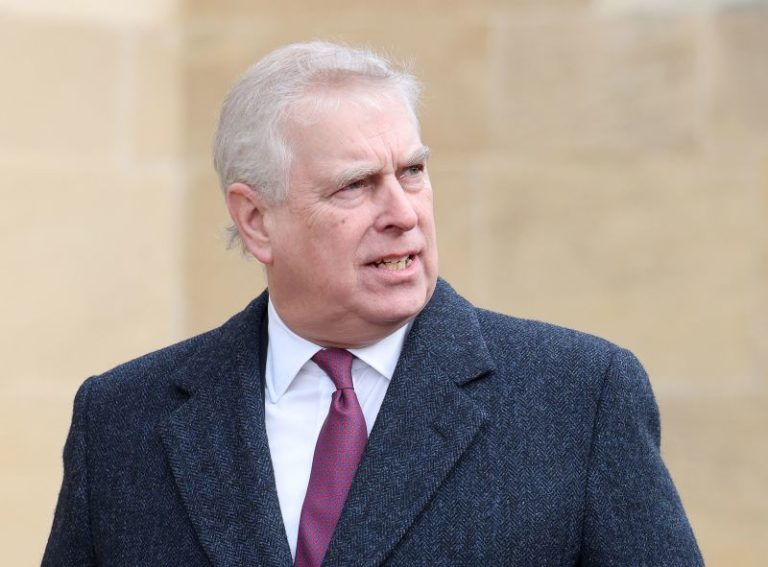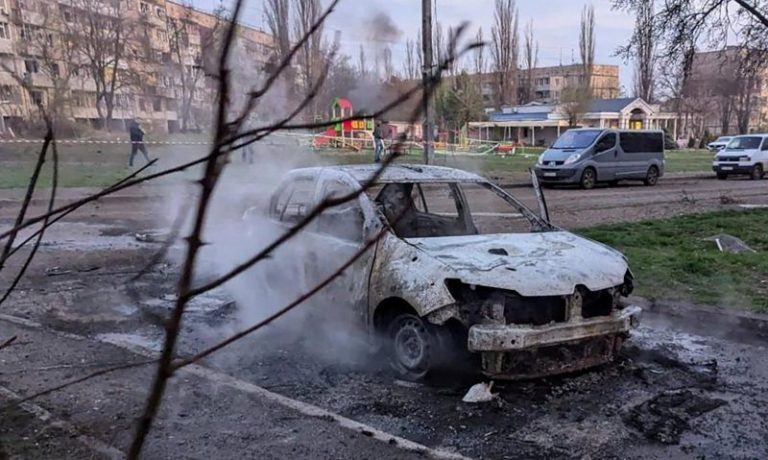The Chinese military officials in brown uniforms fan out around rows of young trees, shoveling soil into freshly dug pits. The camera pans to the most senior leaders one by one, in order of rank. But one prominent face is conspicuously absent.
The news segment, aired Wednesday night on China’s state broadcaster, features a tree-planting event in the outskirts of the capital Beijing – an annual springtime tradition for the country’s military leadership spanning more than four decades.
But Gen. He Weidong, the second-highest-ranking uniformed officer in the People’s Liberation Army, was nowhere to be seen. Nor was he named as a participant in a report by the official state news agency.
Gen. He’s absence from the high-profile event has fueled ongoing speculation that the second-ranking vice chairman of the powerful Central Military Commission (CMC) may have become the latest – and most senior – casualty in leader Xi Jinping’s purge of the military’s top ranks.
As Xi’s No.2 general, He shares a long-standing relationship with the Chinese leader, dating back decades to the early days of their careers in the coastal province of Fujian.
Rumors about an investigation against He first surfaced among the Chinese dissident community following China’s annual political meetings last month. The 67-year-old hasn’t appeared in public for three weeks since the closing ceremony of the country’s rubber-stamp legislature on March 11.
The Chinese government has offered little in the way of clearing the air.
When asked about He’s situation at a news briefing on March 27, Defense Ministry spokesperson Wu Qian said: “There is no information on this matter, and we are not aware of the situation.”
It is now unclear what has happened to He, who also sits on the Communist Party’s 24-member Politburo.
Three weeks out of the public eye is not unheard of for a top general without a public-facing role and there is always a chance he resurfaces. But his no-show at a well-choreographed annual propaganda event stands out in a political system deeply attuned to the importance of symbolism.
“Clearly the absence of one CMC vice chair is important symbolically,” said James Char, a longtime PLA expert and assistant professor at the S. Rajaratnam School of International Studies in Singapore.
Similar to the Communist Party Congresses and annual “two sessions” political gatherings, “it’s important for all the major figures that the rest of the world know of to show up to be in the same picture, because it helps to demonstrate the power and – more importantly – the unity of the party,” Char said.
In the opaque world of Chinese politics, observers have long leaned on arcane signals of Communist Party traditions and protocol to interpret what is going on behind the scenes. The discipline, known as “tea-leaf reading,” has become more relevant than ever in Xi’s era as he centralizes power into his own hands and makes the decision-making process even more obscure.
And now, some experts are scouring this week’s events for clues on the fate of one of Xi’s top generals.
The annual ritual began as part of a nationwide tree-planting campaign launched by late paramount leader Deng Xiaoping in late 1981, following devastating floods he blamed on rampant deforestation. It was billed as a patriotic, selfless undertaking in “greening the motherland, building socialism and benefiting future generations.”
The following spring, Deng, then chairman of the CMC, planted the first tree of the campaign, setting a tradition that has since been carried on by successive Chinese leaders and military top brass.
Wednesday marked “the 43th consecutive year the CMC leadership has collectively participated in the voluntary tree-planting activity in the capital,” said Xinhua, the state news agency.
Since Xi came to power in late 2012, his two vice chairmen on the CMC had led military officers to plant trees without fail every spring – until He’s rare absence on Wednesday.
The first-ranking CMC vice chairman, Gen. Zhang Youxia, attended the event, so did two other generals on the commission, Liu Zhenli and Zhang Shengmin.
The only other uniformed CMC member who did not show up was Adm. Miao Hua, who was suspended under investigation in November for “serious violations of discipline” – a common euphemism for corruption and disloyalty.
“I think He’s absence is quite telling, but again, no one can be absolutely sure,” Char said. “There’s another school of thought, which is He Weidong was involved in the last two weeks with the preparations for the military exercises around Taiwan.”
Starting from Tuesday, combined forces of the PLA’s Eastern Theater Command held surprised exercises around Taiwan for two straight days, testing capabilities to blockade the self-ruling island, simulate strikes on its ports and other critical infrastructure, and launch long-range live-fire strikes.
The commander of the Eastern Theater Command from 2019 to 2022 was He. It was during his tenure that the Eastern Theater Command staged massive military drills and fired missiles around Taiwan in August 2022, in retaliation against then US House Speaker Nancy Pelosi’s visit to Taipei.
A prolonged absence from public view does not always signal trouble for Chinese officials. Some have resurfaced and resumed their duties. It’s also not uncommon for officials to be taken in for questioning by graft busters to assist investigations into colleagues.
Last November, Defense Minister Dong Jun was reported to be under investigation for corruption by the Financial Times, citing US officials. China’s Defense Ministry dismissed the report as a “sheer fabrication.” Dong reemerged in public a week later. The minister was also seen attending Wednesday’s tree-planting event on the state broadcaster.
After coming to power, Xi consolidated control over the world’s largest military by taking down powerful generals from rival factions and replacing them with allies and loyal proteges.
But a decade on, having structurally overhauled the People’s Liberation Army and stacked its top ranks with his own men, Xi is still knee-deep in his seemingly endless struggle against graft and disloyalty – and is increasingly turning against his own handpicked loyalists.
Since the summer of 2023, more than a dozen high-ranking figures in China’s defense establishment have been ousted in a sweeping purge that focused on the country’s nuclear force and equipment procurement, including two defense ministers promoted to the CMC by Xi.
The ongoing turmoil roiling the senior ranks of the PLA has raised questions over Xi’s ability to end systemic corruption in the military and enhance its combat readiness at a time of heightened geopolitical tensions.
“Recurring purges of the senior-most PLA leaders indicate that Xi Jinping distrusts his officer corps,” said Drew Thompson, a senior fellow at the RSIS.
“The constant removal of so many senior officers, as well as the extent of corruption running to the very top undoubtedly has an effect on the PLA’s morale, and likely also its military capabilities,” Thompson added.
But some analysts noted that by this point, the PLA may have well become accustomed to the shake-ups in its high command.
“Leadership purges in the PLA seem to have become normalized to a point that it’s just part and parcel of being the PLA,” said Collin Koh, another research fellow at RSIS.
The Chinese military may have started to grow accustomed to the purges – to a point where it is able to isolate them from its daily operational activities and go on with business as usual, Koh noted.
“It does not necessarily mean that because of the purges, the PLA has started to relent on readiness. These purges might potentially have the effect of reminding the PLA to do their work better – if anything, if you want to escape the purges, then one way to do that is to obey what the party is telling you, which is to be prepared for conflict,” he said.
Like Miao, He is widely believed to have forged close personal ties with Xi during their overlapping years in Fujian, where the future Chinese leader was rising through the ranks as a local official in the 1990s and early 2000s.
Both He and Miao spent most of their early career serving in the former 31st Group Army in Fujian, which became a major power base for Xi. A string of military officers hailing from the 31st Group Army have been fast-tracked for promotion since Xi took power in late 2012.
Gen. He was no exception. In 2013, he was promoted to commander of Jiangsu Military District; less than a year later, he became commander of the Shanghai Garrison. In 2016, he was promoted yet again to command ground forces of the Western Theater Command, which oversees China’s border with India.
He was promoted to full general in 2017, when he became commander of the Eastern Theater Command, responsible for leading any military invasion or blockade of Taiwan.
But the ultimate sign of Xi’s trust in He came at the 20th Party Congress in 2022, when He landed the CMC vice chairmanship – an unusually rapid rise for an official who hadn’t served on the Central Committee of the ruling Communist Party.
During that leadership reshuffle, Xi stacked the CMC with six loyalists. If confirmed to be under investigation, He would be the powerful military body’s first sitting vice chairman to be purged by Xi and the third member on the current CMC to fall from grace.
The last time a sitting CMC vice chair was purged was more than three decades ago, when then-Party General Secretary Zhao Ziyang was ousted for sympathizing with student protesters in the 1989 Tiananmen pro-democracy movement.
“What happens finally to He Weidong gives us a window into how the political system in China is being restructured further under Xi Jinping,” Char said, noting the PLA’s reform of its rigid political structure.
“I don’t think anyone in the system now is irreplaceable,” he said. “This is what a political strong man does. He’s ruthless… he’s continuously purging his own ranks to keep his generals on their toes.”
This post appeared first on cnn.com



